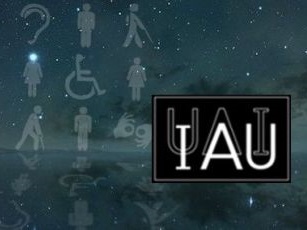 For Global Astronomy Month (GAM) 2017, Astronomers Without Borders (AWB) are teaming up with the IAU Working Group Astronomy for Equity and Inclusion and have compiled a list of thirty resources to be highlighted during April.
For Global Astronomy Month (GAM) 2017, Astronomers Without Borders (AWB) are teaming up with the IAU Working Group Astronomy for Equity and Inclusion and have compiled a list of thirty resources to be highlighted during April.
People with special needs are often overlooked when planning outreach and educational activities and remain a group still frequently excluded from events. The thirty resources highlighted are a free, open source collection intended to support and facilitate the implementation of activities for people with disabilities. The selected best practices, programs, examples of activities, resources and activities guidelines are dedicated to helping outreach and education groups that aim to reach these particular audiences but need more support for doing it.
This collaboration between IAU WG and AWB also intends to be a call for action, to everyone that wishes to implement these activities and wants to know more about how to create and implement resources for people with disabilities. If you want to implement an activity inspired by one of these resources or needs help how to start contact us (Amelia Ortiz-Gil and Lina Canas) and share your ideas, questions and also your experiences with our teams.
We will be highlighting one of these resources every day here, below, and also on our GAM Facebook page and the IAU Working Group Astronomy for Equity and Inclusion Facebook page. The complete list of resources is also available.
April 5 The Incredible Two-Inch Universe intends to explore the universe by shrinking cosmic scale in four steps, zooming out from the realm of the Earth and Moon to the realm of the galaxies. You can use this four-step scale model to imagine some of the distances involved in NASA's explorations of the Universe. Credit: This is a NASA-Smithsonian Universe Forum Publication and the ASL videos created by the Institute for Disabilities Research and Training, Inc. for SERCH NASA Broker/Facilitator at the College of Charleston.
Read more...
April 4 " Making Sense of Astronomy " is a Scottish Government Talking Science grant-funded project, working with Deaf scientists and linguists to help make astronomy more accessible to the Deaf community by creating new British Sign Language specific to astronomy. This British Sign Language Glossary for Astronomy curriculum terms can be found on the Scottish Sensory Centre website."
Read more...
Phil Plait (AKA the Bad Astronomer) teaches you astronomy in a series of 47 videos with English captions (and many in other languages too). Welcome to the first episode of Crash Course Astronomy. Your host for this intergalactic adventure is the Bad Astronomer himself, Phil Plait. We begin with answering a question: "What is astronomy?" Phil Plait writes Slate's Bad Astronomy blog and is an astronomer, public speaker, science evangelizer, and author of Death From the Skies!
Read more...
With almost 100 videocasts by the European Southern Observatory, with captions in many different language, ESOcast is a video podcast series dedicated to bringing you the latest news and research from ESO – Astronomy made on planet Earth. Here we explore the Universe's ultimate frontier with our host Doctor J, a.k.a. Dr. Joe Liske. The ESOcast is offered for download in several formats: standard (.mov, .mpeg, .mp4, .m4v) and HD (High Definition). HD is rapidly evolving into one of the leading video formats in the video on-demand market. Information on the specs of the available video formats is accessible on...
Read more...
Captioning is the process of converting the audio content of a broadcast, webcast, video, live event, or other productions into text and displaying the text on a screen, monitor, or other visual display system and makes audio and audiovisual material accessible providing a critical link to communication, information and education (from National Association for the Deaf Captioning for Youtube and a couple of useful tips on how to caption a video for free .
Read more...
 For Global Astronomy Month (GAM) 2017, Astronomers Without Borders (AWB) are teaming up with the IAU Working Group Astronomy for Equity and Inclusion and have compiled a list of thirty resources to be highlighted during April.
For Global Astronomy Month (GAM) 2017, Astronomers Without Borders (AWB) are teaming up with the IAU Working Group Astronomy for Equity and Inclusion and have compiled a list of thirty resources to be highlighted during April.





